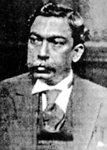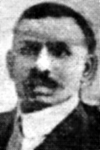
Sunday,
February 04, 2007
Vol.
41 - No 36
|
Brave and valiant effort towards the struggle of freedom Barrister-at Law E.B.D.Perera carried the petition against the atrocities of the British rule to England, hidden in his shoes for fear of being traced, goes down in the annals of history as a brave and valiant effort towards the struggle for freedom. Stalwarts in the like of F.R. Senanayake too were personalities who contributed to this cause.
One night on June 3rd 1915 F.R.Senanayake came to his residence with an invitee who was a stranger to the place in spite of the numbers entertained in his abode. He was a Sinhalese youth from Kurunegela and was a skilled cobbler by profession. The Senanayake resident had a habit of treating people of any trade as a guest and he was treated with great hospitality. He was taken by Senanayake to his library after some time and gave him a pair of shoes and instructed the youth to complete his mission. The boy using his tools removed the heel of a shoe that was given to him with Senanayake watching his every move intently. This was a historical piece of act that planned the independence of the country. The document that was being stitched into the heel of the shoe was a petition to King George V against the massacre and torture of Ceylonese in the hands of British Officers in the island and the request for freedom of oppression and governance. It also stated the Act of Marshal Law incorporated during the period. No news reached beyond the shores of Ceylon and letters were confisicated or limited and subject to supervision. National Leaders were not allowed to venture abroad on any grounds. The petition was written on the instruction of F.R.Senanayake by Professor J.E.Gunasekera, Principal Maradana Mahabhodi Vidyalaya and Ananda Vidyalaya. In the Colombo Municipal Committee Meeting Minutes it has been recorded on September 15th 1966 that part of Kynsey Road be named J.E.Gunasekera Mawatha after him for the great service done in his contribution towards freedom. During the riots between the Sinhala and Muslims, travelling abroad was only possible by sea. Ships moving towards England were targeted by German submarines. The trip was daring but the brave effort of taking the message across was requested by F.R.Senanayake from E.W.Perera who did not hesitate to accept it showing the courage and least concern for life to bring independence to Sri Lanka. If the Englishmen had a clue of what this Barrister-at Law was up to in his journey to England, he would have only been imprisoned and killed. There was no barricade during his journey in the wake of his mission of achieving independence for the country.
The policy of the British was one of principles that always respected War Acts and never resorted to murder or torture during riots and rebellions. Sentence of death was passed only after evidence and proof justified the cause. British Officers in Ceylon did not respect the law and acted brutally during communal riots. In 1829 King George 1v appointed Major W.M.P Colebrooke in 1830 and Charles H. Cameron on March 12th to restrict the actions of such officers to certain areas. The law stated that no person involved in revolts against the government or any misdemeanors against the peace of the country should be produced in courts and not be punished or taken into custody. In spite of which in 1848 the rioters were tortured and massacred brutally. The law was strengthened but Governor Charmers and Herman went beyond the law and was involved in many unlawful atrocities E.W.Perera was the only person who was allowed to go to England for studies and he was able to take the petition hidden in his shoe. He met the Attorney General Sir Anton Bertram to receive legal entry to England. In the first week of JUNE 1915, he was able to make this historical journey on behalf of his motherland. This has been recorded in the book 'Hundred days in Ceylon under Martial Law IN 1915' and 'Riots and Martial Law in Ceylon 1915' but according to .E.W.Perera's records of his works in England it is given as the first week of July 1915. E.W.Perera reported the actions taken against the people of the country to the British ruler and initially his complaint was not accepted. E.W.Perera persisted and an order was sent to stop all violence by the British Officers in Sri Lanka. A detailed report by Minister Theodore Taylor proved to the British rulers of the attacks and injustice meted to the Ceylonese. Protest meetings were organized in England and the media highlighted the injustice prevailing in the island. This situation arose after the petition was handed over by E.W.Perera whose trip was wholly financed by F.R.Senanayake. The nation is indebted to these national heroes who fought for justice and freedom. |
| |
Copyright
2007 Wijeya
Newspapers Ltd.Colombo. Sri Lanka. |

